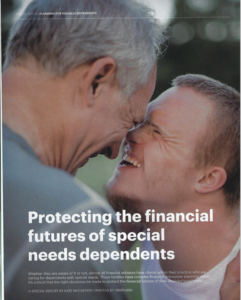May 18, 2020
What is Personal & Advance Care Planning?
The COVID-19 crisis has caused significant uncertainty and fear throughout the world. Life has changed dramatically over the past several months and many of us are unsure of what this means for the future. However, as we adjust and manage this new reality of self-isolation, other important questions have arisen. How will we manage personal and healthcare decision-making? Specifically, who will communicate our healthcare wishes and/or make decisions about specific medical treatments if we or someone we love loses the ability and/or capacity to make those decisions? For members of the disability community, these issues are even more relevant given our greater reliance on the healthcare system. We are also at much greater risk of being impacted by the coronavirus.
Personal & Advance Care Planning is a process of reflection and communication. It is a time for each of us to consider our values and wishes, and to inform others of what kind of health and personal care we would want today and in the future if we were unable to speak for ourselves. Unfortunately, many of us have not prepared for the management of our healthcare. Few people living with a disability have had a discussion with a family member or friend about what healthcare treatments we would or would not want if we were ill and unable to communicate and make decisions.
The pandemic has made it clear that we must carefully consider and document our wishes and/or instructions for present or future healthcare and personal planning should we become incapable of deciding for ourselves.
Developing a Personal & Advance Care Plan
In British Columbia, adults are presumed capable of making decisions about their personal planning and healthcare until the contrary is demonstrated. The contrary is “demonstrated” through medical evidence establishing that an adult is incapable due to, for example, dementia or acute or chronic illness. As long as an adult is capable, only that person is entitled to make health care decisions. Their informed consent to treatment must be sought and obtained by care providers.
Ideally, an advance care plan should be developed well before capacity becomes an issue. A well-designed plan will also provide a summary of the kinds of health care and treatment you do or don’t want to have if something should happen to you and you can’t make health care decisions for yourself. Therefore, it is important to carefully consider what is important to you, and how you want health-care decisions to be made for you.
The advance care plan should also communicate and outline to your family, friends, and healthcare providers, what to do if you’re unable to decide what you want. It must clearly outline your wishes which will hopefully reduce the risk of conflict amongst your loved ones and assist them in making difficult decisions should this be required.
The advance care plan will also allow you to appoint an individual/individuals (such as a family member and/or a friend or friends) to make health care decisions for you if you are unable to make them for yourself, commonly called a “substitute decision-maker”, or a “health care representative”. However, as long as you can still make your own decisions, your advance care plan won’t be used and you will always have the ability to say “yes” or “no” to healthcare treatment at any time.
Finally, once the above have been clarified, it is vital that the advance care plan be written or documented to give legal effect to your wishes. The two primary legal documents utilized in British Columbia in giving effect to a personal or advance care plan are a Representation Agreement and an Enduring Power of Attorney.
These two legal documents allow individuals to plan for the possibility of future incapability by appointing another person, persons, and/or an entity to manage their personal and health care needs and financial matters in the event they are not able to do so on their own.
Representation Agreements
A Representation Agreement is one of the primary legal documents available in British Columbia for personal and advanced care planning. It is a legally enforceable contract and utilized to manage incapacity, end-of-life decision-making, and other supportive decision-making for those who are 19 years of age or older. It is the only way to authorize someone, called a Representative, to assist you or to act on your behalf for healthcare and personal care matters.
A Representative has legal authority to help you manage your affairs and carry out your wishes if you require temporary or ongoing assistance due to illness, injury or disability. The Representative has a responsibility to put your interests before their own, and must act honestly and in good faith, exercise reasonable care, and act within the limits of the authority given to him/her/them. If possible, the Representative must consult with the adult about their wishes and must respect the adult’s wishes, unless it is unreasonable to do so. The Representative must act based on the adult’s known values and beliefs, and in the adult’s best interests, if those beliefs are not known. Finally, a lawyer or notary is not required to develop and execute a Representation Agreement but you will require two independent witnesses.
There are two types of Representation Agreements, a Section 9 Representation Agreement (“RA9”), and a Section 7 Representation Agreement (“RA7”), the primary distinction being based on an assessment of the mental capacity of the adult at the time of creating the agreement.
(1) Section 9 Representation Agreements
The RA9 allows you to appoint someone to assist you with a broad range of advanced healthcare decisions. It is only available where an adult is mentally capable of understanding the nature of what is covered in the RA9 and can fully comprehend the effect of authorizing someone to act on his/her behalf for health and personal care. It also permits an adult who is capable now of making their own decisions to prepare for the future and to outline their wishes regarding incapacity, end-of-life, and other future situations.
(2) Section 7 Representation Agreements
The RA7 or Standard Representation Agreement is utilized where an adult’s mental capability to understand is in question (for example, after a stroke) and is limited to routine finances as well as minor and major healthcare and personal care. Representatives under the RA7 cannot make, or help you make, decisions to refuse healthcare necessary to preserve life or to determine where you should live if you require more significant care.
Enduring Powers of Attorney
An Enduring Power of Attorney (EPA) is a legal document used for financial and legal planning in British Columbia. An adult may name an Attorney to make decisions on the adult’s behalf in relation to his/her financial and legal affairs if you require assistance due to illness, injury, and disability. Much like the RA9, you must be mentally capable of understanding the nature of what is covered in the EPA and comprehend fully the effect of authorizing someone to act on your behalf for financial and legal decisions.
The EPA is commonly combined with an RA9 which manages comprehensive health and personal care.
Failure to Develop an Advance Care Plan
Temporary Substitute Decision Makers (“TSDM’s”)
What is the result if an adult has not made a Representation Agreement or Enduring Power of Attorney? In these circumstances, legislation may apply to appoint a substitute decision-maker. The Health Care (Consent) and Care Facility (Admission) Act (“HCCF Act”), permits a health care provider to turn to a temporary substitute decision maker (“TSDM”) where there is no advance care plan in place. In order of priority, this will be the adult’s spouse, child, parent, brother or sister, grandparent, grandchild, any other relative, close friend, or person related to the adult by marriage. This person must be over 19, have been in contact with the adult during the preceding 12 months, have no dispute with the adult, be capable of consenting, and be willing to comply with certain similar requirements to those imposed on a representative.
It is not always clear who should be selected. For example, multiple adult children would have an equal right to be selected. Additionally, it may not be clear whether the proposed person has a “dispute” with the adult and it is not certain which criteria a health care provider will apply to choose the TSDM.
If you or anyone disagrees with a decision that is being made for the adult by the substitute decision maker, you may have the right to ask a court to review that decision. The first step is usually to give notice of your objection to the decision maker, to the health care provider and to the Public Guardian and Trustee (“PGT”).
The Adult Guardianship Act also authorizes designated agencies, such as health authorities, to provide health care to an adult in cases of emergency and in situations of abuse or neglect where the adult requires support and assistance. In certain circumstances, the manager of a care facility may admit an adult to an institution without the adult’s consent under the HCCF Act.
Private Committeeship
Private Committeeship is a method of protecting the interests of a dependent adult (the “Patient”) who is incapable of managing his or her affairs where no personal and advance care plan is in place. The Patients Property Act, legislates how a committee is appointed and how the personnel, financial and legal affairs of the Patient is managed. A committeeship appointment requires the court to declare that the Patient is incapable of managing their affairs, their selves or both their affairs and their selves. It is a relatively expensive court application and requires medical evidence of typically two physicians declaring that the Adult is incapable of managing their person and/or affairs.
Conclusions
The best way to avoid the uncertainty associated with the appointment of a TSDM or Private Committee and to ensure that your wishes regarding your healthcare and financial affairs are respected, is to develop a Representation Agreement and Enduring Power of Attorney, to appoint someone you trust to make or help you make decisions.
There is no better time than today to have discussions with family, friends, prospective decision-makers, healthcare providers, and financial and/or legal professions about your wishes.
By: Ken M. Kramer, Q.C.




